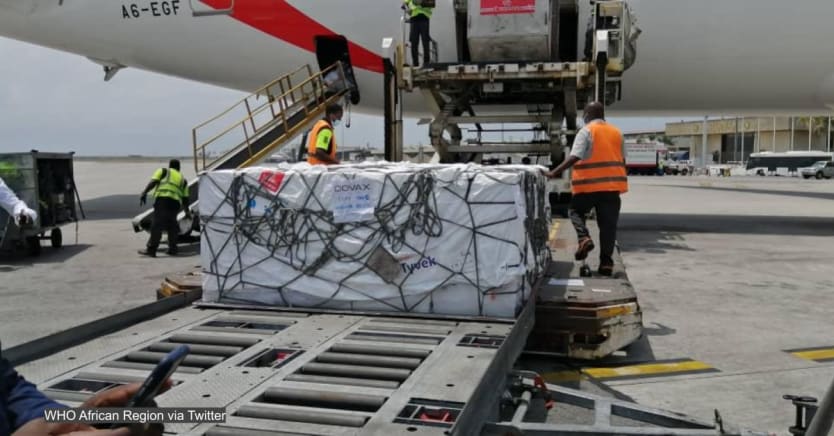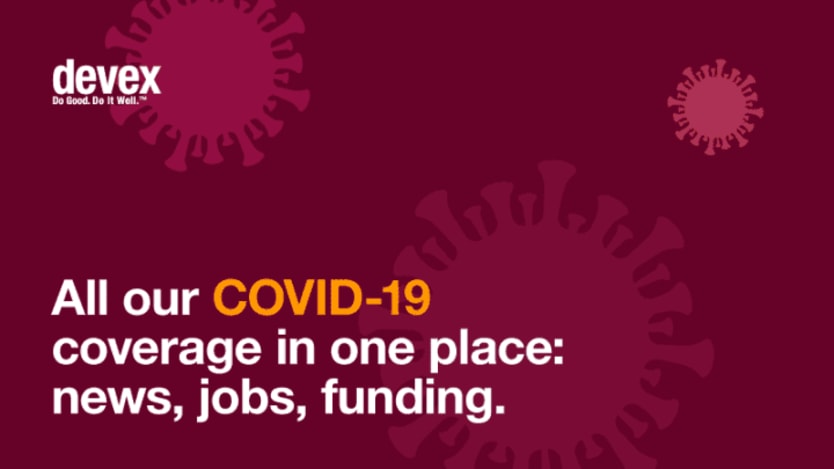
Jean-Paul Loue never hesitated. The 40-year-old nursing student was first in line to get his COVID-19 jab earlier this month as Côte d'Ivoire distributed initial vaccine doses from the global COVAX initiative.
“I’m happy to finally get the vaccine,” Loue said, entering the Parc des Sports complex in Abidjan, Côte d'Ivoire’s commercial capital. Inside, Loue urged all the country’s front-line workers — nurses, teachers, and security forces — to follow his lead.
“Getting vaccinated isn’t just about your health, but about protecting your colleagues, friends, and family,” he said.
Côte d'Ivoire was the second country to receive doses from the COVAX Facility, which aims for equitable access to COVID-19 vaccines. The nation received more than 500,000 doses of the vaccine developed by AstraZeneca on Feb. 26, just days after the first COVAX shipment landed in Ghana.
The government set a target of vaccinating 20% of the population, starting with front-line workers. But as of Sunday, it had only inoculated 34,388 people. By comparison, neighboring Ghana administered more than 420,000 of its 600,000 AstraZeneca doses within two weeks.
“Our countries are used to vaccination campaigns, but the influence of the international media in the management of information about the vaccine reinforces skepticism.”
— Aissata Sanon, communication-for-development specialist, UNICEFHealth experts fear that Côte d'Ivoire’s low figure may be the result of vaccine hesitancy and are working to dispel misinformation circulating about the vaccine.
After the COVAX delivery, it took Ivorian authorities only 48 hours to set up the first vaccination center, located in a massive tent next to a soccer stadium in Abidjan’s Treichville neighborhood. The country administered its first jabs on March 1, and within just two weeks it had installed dozens of vaccination centers across three major cities: Abidjan, Yamoussoukro, and Bouaké. But the rollout itself has been slow; In the first week, only 2,924 people were inoculated.
Though an Africa Centres for Disease Control and Prevention survey found that 71% of Ivorians are willing to accept a COVID-19 vaccine if it is deemed safe and effective, health authorities are still concerned that the low number of inoculations may be linked to vaccine hesitancy.
“Our countries are used to vaccination campaigns, but the influence of the international media in the management of information about the vaccine reinforces skepticism,” said Aissata Sanon, communication-for-development specialist with UNICEF in Abidjan.
Marcel Tao, a 32-year-old nurse in the infectious and tropical diseases department at the University Hospital in Treichville, added that there are currently a lot of rumors and fake news surrounding the vaccine.
“Some people say it’s a Western disease. Many don’t know anyone who has fallen ill and doubt the coronavirus even exists,” Tao said. “Others worry about the secondary effects and the fact that the vaccine hasn’t been tested here.”
The countries that don't want the COVID-19 vaccine
Some African countries have not made plans to inoculate their populations, but public health experts are calling on them to follow scientific evidence and give their citizens a choice regarding vaccination.
The Africa CDC survey also found that 2 in 3 Ivorians believe that the threat from the coronavirus is exaggerated and that 54% — higher than the continental average of 41% — have seen a lot of disinformation about COVID-19. In addition, 42% said they believe that COVID-19 is “a planned event by foreign actors.” Those who said they believe in conspiracy theories also tended to show lower vaccine confidence.
In response, UNICEF and its partners have set up a watchdog committee to track and respond to rumors on social media platforms.
“We’re working closely with the administrators of the Facebook pages to remove unverified information,” Sanon said.
However, Tao said the government should have done more to ensure that people were well informed.
Other health experts are optimistic that Ivorians will come around.
“In the beginning, there were a lot of rumors and fake news,” said Joseph Benie Bi Vroh, director at the National Institute for Public Hygiene. “We’re working actively to reach out to people. I’m convinced that more people will come around.”

